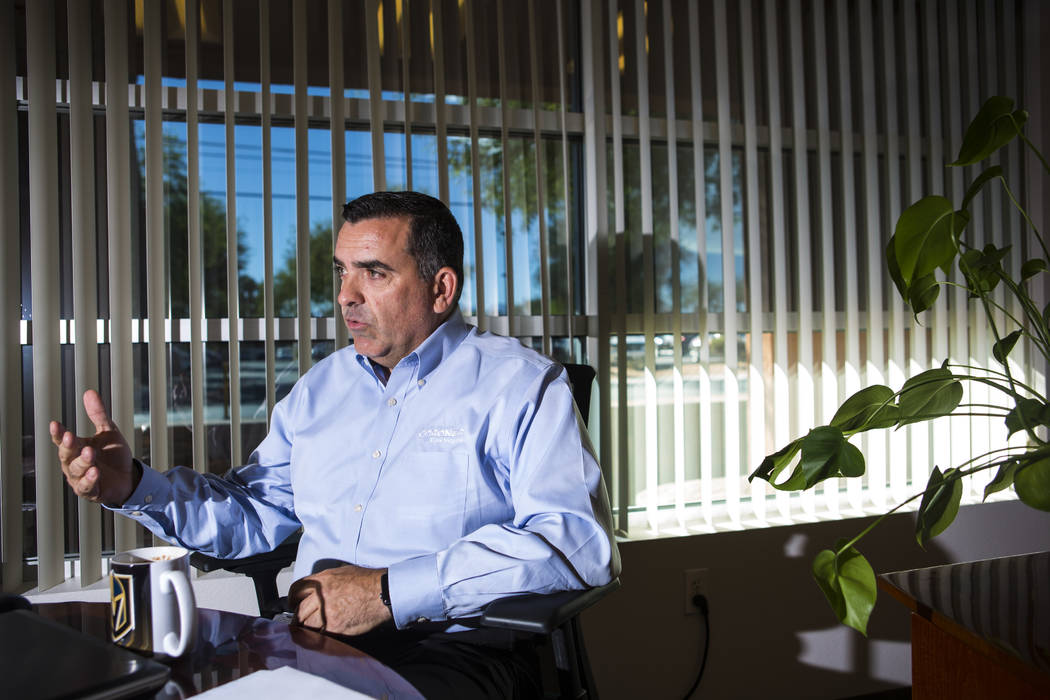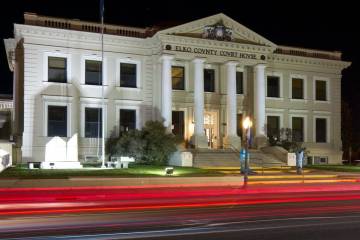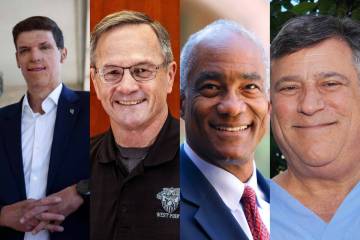How government lobbyists tried to derail public records reform bill
The day after a Nevada Senate subcommittee hearing on a hotly contested public records reform bill, a Reno city lobbyist greeted government officials also trying to defeat the legislation: “Good morning, secrecy squad!”
Reno Chief of Staff Dylan Shaver’s text message to six other lobbyists is part of a trove of records obtained by the Las Vegas Review-Journal illustrating government concerns about Senate Bill 287 and strategy to combat it.
To mark the beginning of Sunshine Week on Sunday, when news organizations across the country annually observe the public right to open government, the Review-Journal examined hundreds of pages documenting communications between government lobbyists who sought to derail the bill.
Most of the communication was benign, but some of the correspondence signaled a skepticism of journalists. And others, like the “secrecy squad” comment, lobbyists said should be viewed as tongue-in-cheek humor between colleagues.
But Maggie McLetchie, a First Amendment rights lawyer and outside counsel for the Review-Journal, is unconvinced.
“I think there’s truth to that joke. They really were the secrecy squad,” McLetchie said. “The offensive part is not that they made that joke. What’s offensive is local government agencies spending taxpayer money to pay lobbyists to sit in Carson City to fight the public’s right to access for information.”
Senate Bill 287 approved
Nevada lawmakers unanimously voted to strengthen the state’s public records law during the last legislative session, substantially reforming access to information from taxpayer-funded agencies.
Now governments can be fined for “willfully” failing to comply with the law, employees must help requesters clarify searches to find records they seek, and a provision was removed that had enabled officials to charge for “extraordinary use” of staff time. The law allows governments to recover the “actual cost” of fulfilling requests.
But the push to overhaul the law — signed in June by Gov. Steve Sisolak and effective Oct. 1 — didn’t get done without a fight.
“The sheer number of lobbyists both public and private who were being marshaled to oppose this effort was pretty astounding,” said Tod Story, executive director of the ACLU of Nevada and co-founder of Right to Know Nevada, the coalition that backed the public records reform bill in the 2019 Legislature. The Review-Journal was part of the coalition.
Meet the secrecy squad
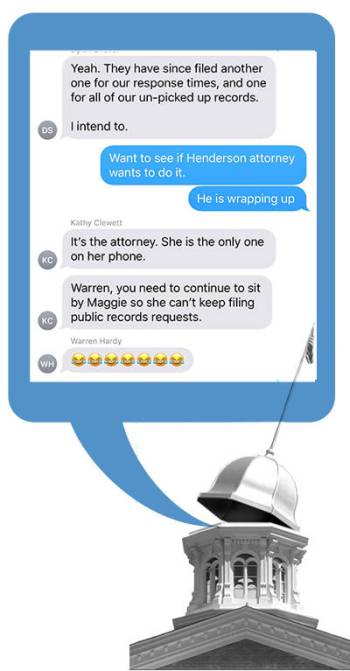
Shaver’s quip to half a dozen other lobbyists in Las Vegas, Clark County, Henderson and elsewhere in the state was followed by a heads-up.
“As expected press has started calling electeds — mine, at least — to put them on the spot over the public records bill,” he wrote. “May be wise to warn your own if you haven’t already.”
Shaver brushed off the “secrecy squad” comment as a joke in an interview with the Review-Journal. He said it referred to proponents of the bill mischaracterizing lobbyists as being against transparency.
In another text message, Sparks lobbyist Kathy Clewett had a suggestion for Warren Hardy, a former state senator who represented the two-dozen member Nevada League of Cities: “You need to continue to sit by Maggie so she can’t keep filing public records requests.”
It was a reference to McLetchie.
Questioning motivations
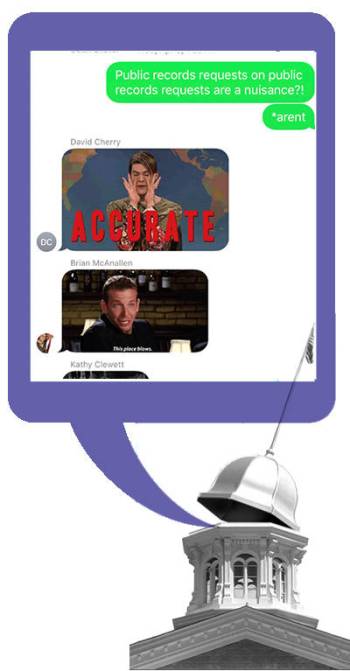
Records and testimony to lawmakers show that government concerns were not limited to effects on public agencies, as some lobbyists questioned the motivations of journalists.
In one text message, Shaver agreed with testimony to lawmakers by Clark County Coroner John Fudenberg who said journalists wanted autopsy reports only to sell newspapers: “He’s right. It’s clicks.”
“You write about things the public wants to know about and drive traffic to your enterprise,” Shaver told the Review-Journal, conceding that his point could have been clearer and that he was not trying to disparage the news industry.
The county declined to make Fudenberg, who sought to keep autopsies exempt from the Public Records Act, available for an interview for this story. The Nevada Supreme Court last month ruled autopsies are public records after a three-year legal battle between the county and Review-Journal.
Matthew Christian, the Metropolitan Police Department’s assistant general counsel, shared Fudenberg’s sentiment in public testimony submitted to lawmakers on April 3: “The (Nevada Public Records Act) is an easy way to fill space in the newspaper without even having to hire reporters.”
“The opposition to the bill went way beyond resentment of journalists and requests for information, although that clearly exists,” Review-Journal Executive Editor Glenn Cook said. “These kinds of quotes illustrate a systemic hostility to accountability. Bureaucrats just don’t want the public to have a window into taxpayer-funded government functions.”
Lobbyists interviewed by the Review-Journal insisted they had reasonable objections to early versions of Senate Bill 287, which they considered an overblown solution to issues that did not exist.
Their concerns varied: The bill risked individual privacy; ignored good-faith efforts by governments to fulfill requests; required staff to intuitively assist record-seekers in pinpointing exactly what they were after; and removed their ability to recoup costs incurred in fulfilling work-intensive requests.
“We knew and had experienced ourselves many denials for public records, and many times the excuses were pretty flimsy and seemed like some kind of avoidance tactic,” Story, the ACLU of Nevada executive director, said in reference to why fines were critical.
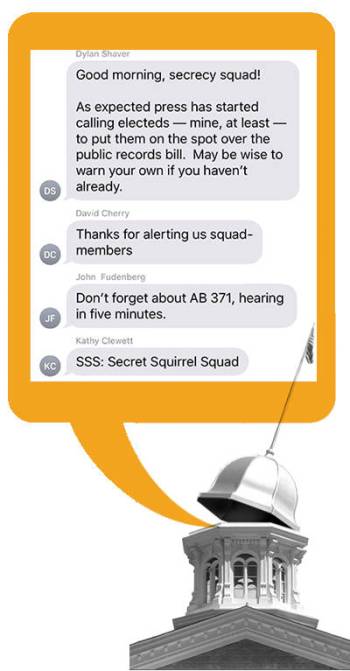
As the first hearing on the bill neared in April 2019, a draft document originating from Metro that detailed its concerns was circulated among a distribution list of lobbyists who opposed the bill.
Kelly Crompton, government affairs manager for the city of Las Vegas, urged the lobbyists to work off the document to submit their own concerns while keeping it confidential and deleting or shredding an earlier version.
Crompton said the directive to shred a public record, however, was not nefarious but only to keep track of the most current input.
“It was more to say, ‘Don’t use the wrong version,’” she said in an interview.
Willing to compromise?
The first version of the bill made government employees personally liable for blocking access to records, with fines up to $250,000. Lobbyists castigated the measure for being too punitive and dissuading employees from wanting to oversee such requests.
The final version of the bill included much lower and non-personal fines for agencies that obstruct access to records: a $1,000 fee for the first offense and up to $10,000 for a third and later offenses. The bill, unanimously passed by the state Senate and Assembly, included a reset period of 10 years to ensure governments would not be penalized in perpetuity.
Multiple governments expressed frustration, however, that they were not consulted about the legislation before committee hearings. And in one instance, records show an intent to use the perceived lack of collaboration as leverage.
Hardy, the lobbyist for the League of Cities, wrote in an email to other lobbyists that being forthcoming with lawmakers and the public could enable them to frame the debate and “firmly control the moral high ground.” Hardy maintains that governments had a legitimate reason to push back.
Both sides shared past efforts to be collaborative that they said fell flat. Story, the head of ACLU of Nevada, said government lobbyists opposed a public records bill in 2017 despite his attempts to be inclusive.
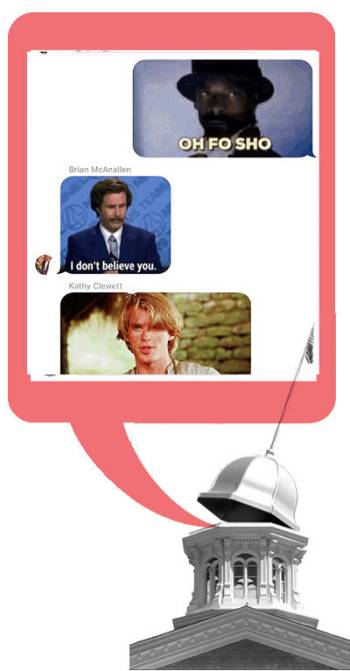
And Christian, the legal counsel for Metro, testified that the police department tried to work directly with news media in the aftermath of the Oct. 1, 2017, mass shooting on the Strip but still ended up being sued.
Those were lies, according to a letter Cook sent to lawmakers. It was the lawyers representing news agencies who offered to work with Metro. The department refused to cooperate, he wrote.
Cook also pushed back on the idea that any lack of compliance with the public records law comes from a lack of resources.
“In fact, the Department routinely violates the Nevada Public Records Act by refusing to release records when they have no legal basis to do so,” Cook wrote.
McLetchie, the Review-Journal’s outside counsel, said the coordinated effort by government lobbyists illustrates the importance of making even more changes to the open records law.
But looking forward, David Cherry, government affairs manager for Henderson, said he is amenable to working with groups like the Nevada Press Association outside the legislative session so governments can learn how best to handle records requests.
“We don’t have to go to the Legislature to do it that way,” Cherry said. “We can just work together to make it work better for everyone. Because at the end of the day, we all are committed to transparency.”
Contact Blake Apgar at bapgar@reviewjournal.com or 702-387-5298. Follow @blakeapgar on Twitter. Contact Shea Johnson at sjohnson@reviewjournal.com or 702-383-0272. Follow @Shea_LVRJ on Twitter. Contact Rio Lacanlale at rlacanlale@reviewjournal.com or 702-383-0381. Follow @riolacanlale on Twitter.



